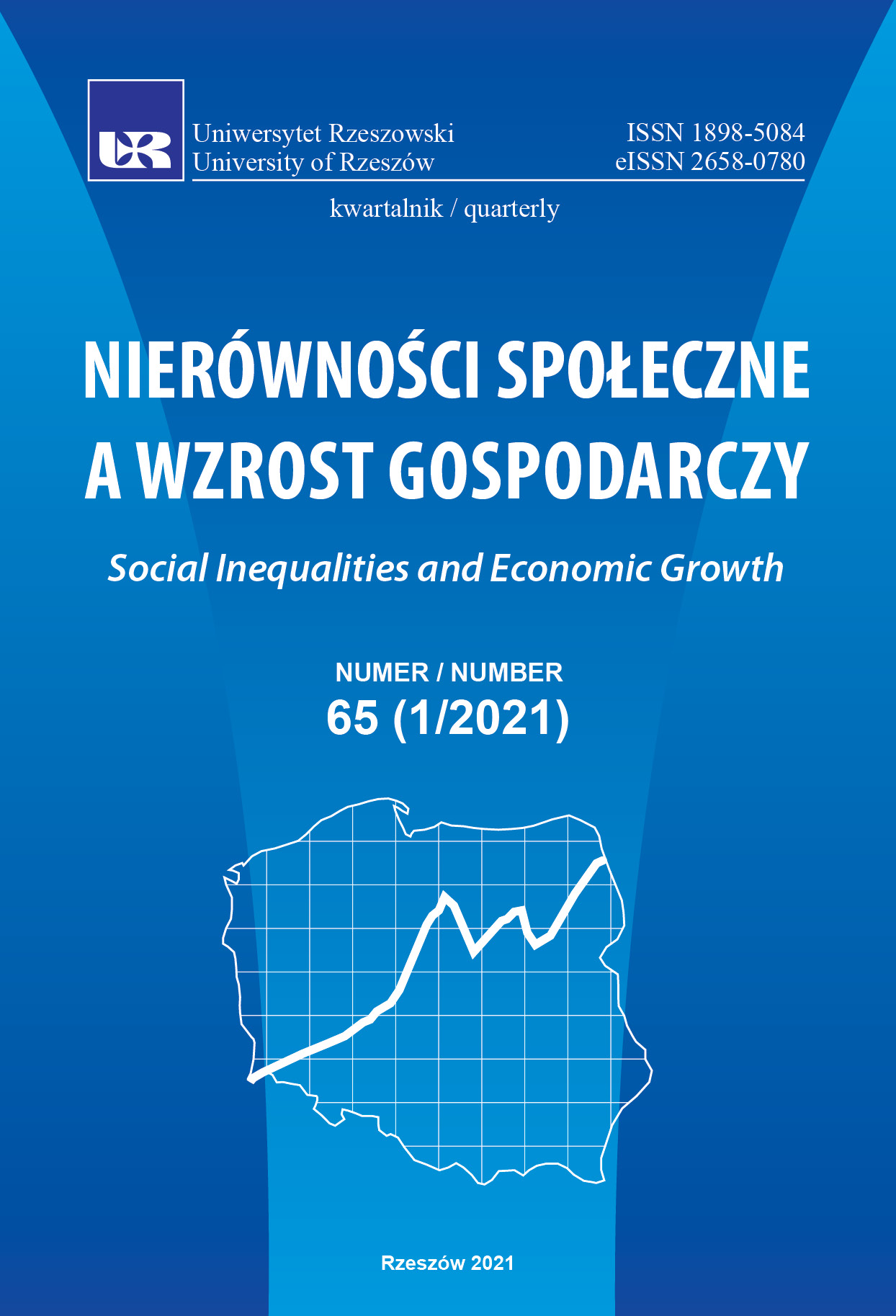Society and culture as a definitive context for research on the impact of technology on the post-modern human
DOI:
https://doi.org/10.15584/nsawg.2021.1.11Keywords:
digital transformation, digital humanities, post-modernity, philosophy of dialogueAbstract
Based on an analysis of selected definitions of the terms used for society and culture, the author creates the sociological theoretical framework for the article. In conjunction with the characterized phenomenon of digital transformation, extensive and far-reaching conclusions are formulated on the impact of new technology for postmodernity. In relation to the scientific achievements of Buber and Tischner, the author deeply analyzes the assumptions of philosophy of dialogue. This allows the observation of a wide dimension in the relationship between the relational nature of social relations, the condition of the individual, the durability of the systems humans create, the technocratic direction of civilizational development and the consumerist attitude to reality in contemporary society of the 21st century.
The author describes technological worship and presents the negative consequences of digital transformation processes. On the example of the service sector, the transition is presented as symbolic culture based on the relations and dialogue with technical and functional culture.
The research method used in the article is a review of the scientific literature. In the study, the author set the goal of determining the impact of digital transformation on humans in the context of the definition of culture and society. As a result of the research, the author states that technological insight (i.e. looking at technology as a way of resolving all contemporary problems) has the danger of successively weakening man, and could lead to a deepening of social inequalities. The author also emphasizes the need to deepen research on the consequences of the digital transformation on society and culture and to develop models that can reduce the negative consequences of the change process.
Downloads
References
Aspin, G., Collins, G., Krumkachev, P., Metzger, M., Radeztsky, S., Srinivasan, S. (2018). Everything-as-a-service. Modernising the core through a services lens. Deloitte University Press.
Cassirer, E. (1977). Esej o człowieku. Wstęp do filozofii kultury. Warszawa: Czytelnik.
Celiński, P. (2013). Renesansowe korzenie cyfrowego zwrotu. W: A. Radomski, R. Bomba (red.), Zwrot cyfrowy w humanistyce. Internet / Nowe Media / Kultura 2.0 (s. 13–36). Lublin: E-naukowiec.
Domańska, E. (2010). Jakiej metodologii potrzebuje współczesna humanistyka? Teksty Drugie, 1–2, 45–55.
Harari, Y. N. (2018). Homo deus. Krótka historia jutra. Warszawa: Wydawnictwo Literackie.
Herder, J. G. (1962). Myśl o filozofii dziejów, t. I. Warszawa: Państwowe Wydawnictwo Naukowe.
Japonia: Humanoidalne roboty dają seniorom namiastkę kontaktu z ludźmi. (2017). Gazeta Prawna, 18.05.2017. Pobrane z: https://www.gazetaprawna.pl/artykuly/1043994,japonia-humanoidalne-roboty-daja-seniorom-namiastke-kontaktu-z-ludzmi.html (2019.09.01).
Kłoskowska, A. (1983). Socjologia kultury. Warszawa: Państwowe Wydawnictwo Naukowe.
Kmita, J. (2007). Późny wnuk filozofii. Wprowadzenie do kulturoznawstwa. Poznań: Wydawnictwo Naukowe Bogucki.
Krajewski, M. (2003). Kultura kultury popularnej. Poznań: Wydawnictwo Naukowe UAM.
Levinas, E. (2006). Istniejący i Istnienie. Kraków: Wydawnictwo Homini.
Luhmann, N. (2006). Pojęcie społeczeństwa. W: A. Jasińska-Kania (red.), Współczesne teorie socjologiczne (s. 414–424). Warszawa: Wydawnictwo Naukowe Scholar.
Markowski, M. P. (2014). Dlaczego humanistyka nie jest nauką? Kraków: Copernicus Festival 6–11 maja 2014. Pobrane z: https://www.youtube.com/watch?v=DyJwwB7L6LQ (2019.09.01).
Marody, M. (2015). Jednostka po nowoczesności. Perspektywa socjologiczna. Warszawa: Wydawnictwo Naukowe Scholar.
Mead, M. (2000). Kultura i tożsamość. Studium dystansu międzypokoleniowego. Warszawa: Wydawnictwo Naukowe PWN.
Misztal, B. (2000). Teoria socjologiczna a praktyka społeczna. Kraków: Universitas.
Nacher, A. (2013). Poza cyfrowość w zwrocie cyfrowym – od humanistyki cyfrowej do spekulatywnej komputacji. W: A. Radomski, R. Bomba (red.), Zwrot cyfrowy w humanistyce. Internet / Nowe Media / Kultura 2.0 (s. 83–100). Lublin: E-naukowiec.
Pieriegud, J. (2016). Cyfryzacja gospodarki i społeczeństwa – wymiar globalny, europejski i krajowy. W: J. Gajewski (red.), Cyfryzacja gospodarki i społeczeństwa – szanse i wyzwania dla sektorów infrastrukturalnych (s. 12–39). Gdańsk: Instytut Badań nad Gospodarką Rynkową – Gdańska Akademia Bankowa.
Rogoziński, K. (2018). GOW. Pobrane z: http://usluga.edu.pl/2018/08/27/gow/ (2019.09.1).
Taylor, Ch. (1996). Etyka autentyczności. Kraków: Wydawnictwo Znak.
Tischner, J. (2002). Myślenie według wartości. Kraków: Wydawnictwo Znak.
Tischner, J. (2012). Filozofia dramatu. Kraków: Wydawnictwo Znak.
Turkle, S. (2013). Samotni razem. Dlaczego oczekujemy więcej od zdobywczy techniki, a mniej od siebie nawzajem. Kraków: Wydawnictwo Uniwersytetu Jagiellońskiego.
Walków, M. (2018). Maszyny mogą mieć intuicję. Przekroczyliśmy próg rozwoju technologii. Business Insider. Pobrane z: https://businessinsider.com.pl/firmy/strategie/cyfrowa-transformacja-co-to-jest/hw6r4qd (2019.09.1).
Ziółkowski, M. (2006). Teoria socjologiczna początku XXI wieku. W: A. Jasińska-Kania, L. M. Nijakowski, J. Szacki, M. Ziółkowski (red.), Współczesne teorie socjologiczne (s. 15–31). Warszawa: Wydawnictwo Naukowe Scholar.
Żółkowska, T. (2013). Ja, Ty, Inny – dialog? Studia Edukacyjne, 28, 19–30.
Downloads
Published
How to Cite
Issue
Section
License

This work is licensed under a Creative Commons Attribution-ShareAlike 4.0 International License.


